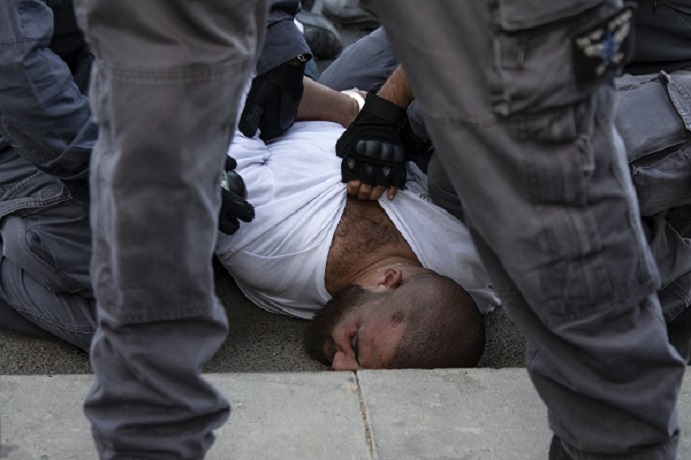Ramona Wadi
Middle East Monitor / April 16, 2020
The annual commemoration of Palestinian Prisoners’ Day can turn easily into a travesty of remembrance. This year, 17 April will be marked with statements calling for the release of Palestinian prisoners from Israeli jails on humanitarian grounds due to the coronavirus pandemic. However, there will be scant realisation that the humanitarian principle, when linked to temporary occurrences, is not sufficient as a premise for claiming human rights. It is the legitimate struggle that should frame the call for the prisoners’ freedom, not Covid-19.
Already in 2020 Israel has detained 1,324 Palestinians; a total of 5,000 are currently held in Israeli jails. In March, coinciding with the coronavirus outbreak in the occupied Palestinian territories, Israel detained 357 Palestinians, including children and women.
Israel has built a false narrative about Palestinian resistance to promote its security narrative, hence the “Palestinian terrorists” label. In reality, the Palestinians have a legitimate right to conduct an anti-colonial struggle by any and all means at their disposal. On Palestinian Prisoners’ Day, this must be brought to the world’s attention before resorting to the humanitarian paradigm which exploits and insults the prisoners by prioritising the pandemic above their political freedom, their rights and the liberation of their land.
If humanitarian principles were truly humanitarian, the anti-colonial struggle would form part of the international narrative. Palestinian prisoners have been defined by events and occasions rather than political principles and the Palestinian cause, perhaps to appease the international community’s penchant of calling for human rights based upon humanitarian agendas. Hence, the heavily-publicised hunger strikes, for example, or a possible outbreak of coronavirus among Palestinian prisoners, which would indeed be catastrophic. However, these are simply part of the wider narrative of the freedom struggle, and emphasising temporary conditions rather than the root cause of the issue is damaging for both Palestinian prisoners and the anti-colonial cause.
Commemorative days are useless if remembrance is tethered to a single occasion without a plan for continuous action. When there is a context other than the prisoners’ struggle for Palestinian liberation, in this case the pandemic, it is easy to reverse priorities in a way that the pandemic takes precedence over the prisoners and their rights. If Palestinians were supported by the international community in their anti-colonial struggle, as they should be, there would be a different discourse in terms of the coronavirus and the Palestinians. Moreover, when the pandemic is over, will the call for the liberation of Palestinian political prisoners be ongoing? Or will it dwindle away to nothing because activism, despite all good intentions, once again availed itself of the pandemic to highlight temporarily the routine violations and negligence by the Israeli Prison Service?
Palestinian Prisoners’ Day ought to be commemorated as a pinnacle to highlight a consistent strategy for liberation. After all, Palestinian political prisoners have embraced anti-colonial struggle on a permanent basis. They must be released because their anti-colonialism is a legitimate cause and does not violate international law. To argue that Palestinian prisoners must be released due to humanitarian concerns during the coronavirus pandemic is flawed, when it is well known that humanitarian principles are subject to the political interpretations of the international community. On Palestinian Prisoners’ Day 2020, therefore, let us politicise humanitarian principles from the perspective of the Palestinian people’s collective memory and narratives, in order to create a consistent strategy that is not dependent upon external circumstances.
Ramona Wadi is an independent researcher, freelance journalist, book reviewer and blogger; her writing covers a range of themes in relation to Palestine, Chile and Latin America













